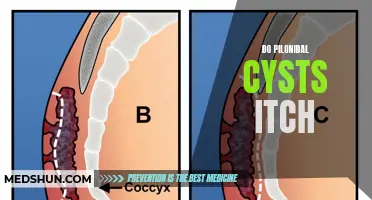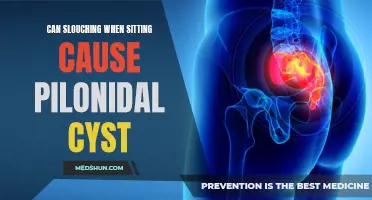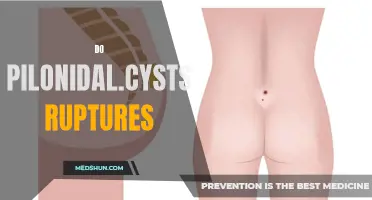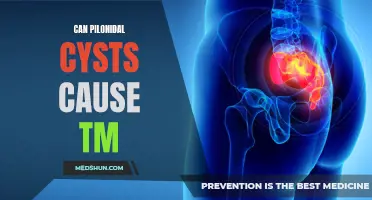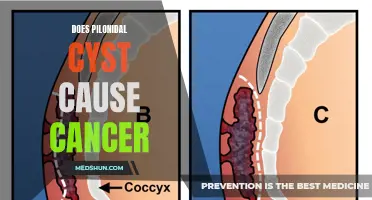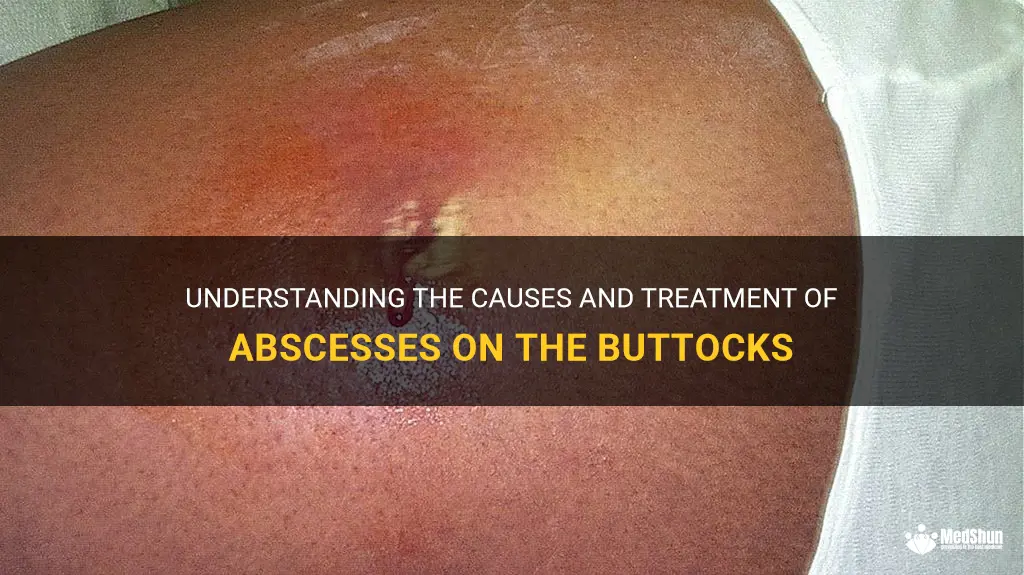
Having an abscess on any part of your body can be a painful and uncomfortable experience. But have you ever wondered how you can get an abscess on your buttocks? It may seem like an unusual location, but there are actually various reasons why this can occur. Whether it's due to a bacterial infection, blocked sweat glands, or even a pilonidal cyst, understanding the causes and symptoms of a buttocks abscess is essential for proper treatment and prevention. So, let's dive into the intriguing world of buttocks abscesses and discover what you need to know about this unusual condition.
What You'll Learn
- What are the common causes of abscesses on the buttocks?
- How do you prevent developing an abscess on the buttocks?
- What are the symptoms of an abscess on the buttocks?
- What is the recommended treatment for a buttock abscess?
- Are there any potential complications or risks associated with a buttock abscess?

What are the common causes of abscesses on the buttocks?
Abscesses on the buttocks can be caused by a variety of factors. These painful and swollen pockets of pus can be quite uncomfortable and may require medical treatment. In this article, we'll explore the common causes of abscesses on the buttocks and discuss their management.
- Poor hygiene: One of the most common causes of buttock abscesses is poor hygiene. When the skin is not properly cleaned, bacteria and other microorganisms can accumulate in the area, leading to infection. This can occur when sweat and dirt mix together, creating the ideal environment for bacteria to thrive. To prevent abscesses, it's important to keep the buttock area clean and dry.
- Friction and pressure: Abscesses can also develop due to excessive friction and pressure on the buttocks. This is particularly common in individuals who are overweight or sit for long periods of time. The constant rubbing of the skin against clothing or surfaces can irritate and break the skin, allowing bacteria to enter and cause infection. Regular breaks from sitting and using proper cushioning can help reduce the risk of developing abscesses.
- Ingrown hairs: Ingrown hairs can also lead to abscesses on the buttocks. When a hair grows back into the skin instead of outwards, it can cause inflammation and infection. This can happen when hair follicles become clogged with dead skin cells or bacteria. It's important to avoid picking or squeezing ingrown hairs as this can further worsen the infection. Warm compresses and gentle exfoliation can often help resolve mild cases of ingrown hairs.
- Skin conditions: Certain skin conditions can make individuals more prone to developing abscesses on the buttocks. For example, hidradenitis suppurativa is a chronic skin condition characterized by recurrent abscesses and boils. This condition occurs when hair follicles become blocked, leading to the growth of bacteria and subsequent infection. Proper management of underlying skin conditions can help prevent abscess formation.
- Immunodeficiency: Individuals with a weakened immune system, such as those with diabetes or HIV/AIDS, are more susceptible to developing abscesses on the buttocks. The immune system plays a crucial role in fighting off infections, and when it is compromised, the body is less able to defend against bacteria. These individuals may require more aggressive treatment and management of abscesses.
Management of buttock abscesses often involves a combination of medical interventions and self-care practices. In some cases, a healthcare professional may need to drain the abscess through a small incision. Antibiotics are often prescribed to help treat the infection. Practicing good hygiene, keeping the area clean and dry, and avoiding excessive pressure or friction can help prevent abscesses from recurring.
In conclusion, abscesses on the buttocks can be caused by poor hygiene, friction and pressure, ingrown hairs, underlying skin conditions, and immunodeficiency. It's important to identify and address the underlying cause to prevent abscesses from recurring. Seeking medical attention and following appropriate management strategies can help alleviate symptoms and promote healing.
Relieve Pilonidal Cyst Pain with These Effective Strategies
You may want to see also

How do you prevent developing an abscess on the buttocks?
An abscess on the buttocks can be a painful and inconvenient condition. It is important to take preventive measures to avoid developing an abscess in this area. In this article, we will discuss how to prevent the development of an abscess on the buttocks.
An abscess is a localized collection of pus that forms when an infection spreads to the surrounding tissues. It results in a painful, swollen, and red bump on the skin. Abscesses can occur for various reasons, including poor hygiene, friction, and the presence of bacteria. Here are some steps you can take to prevent abscesses on the buttocks:
- Maintain Good Hygiene: The first step in preventing abscesses on the buttocks is to maintain good hygiene. This involves regular bathing or showering, using a mild soap to clean the area, and ensuring that the buttocks are thoroughly dried afterward. Proper hygiene helps prevent the buildup of bacteria and reduces the chances of infection.
- Avoid Friction: Friction can cause irritation and contribute to the development of abscesses. To prevent this, it is important to wear loose-fitting and breathable clothing. Tight clothing can rub against the skin and create a moist environment that is conducive to bacterial growth. Opt for breathable fabrics like cotton and avoid synthetic materials.
- Practice Good Wound Care: If you have a cut, scrape, or any open wound on the buttocks, it is crucial to practice good wound care. Clean the wound with mild soap and water, apply an antibacterial ointment, and cover it with a clean bandage. Keeping wounds clean and covered helps prevent bacteria from entering and causing an infection that could lead to an abscess.
- Maintain a Healthy Lifestyle: A healthy lifestyle plays a significant role in preventing abscesses on the buttocks. This includes eating a balanced diet, staying hydrated, and exercising regularly. Proper nutrition and hydration boost the immune system and help fight off infections. Exercise helps maintain overall health and improves blood circulation, which aids in wound healing and prevents infection.
- Avoid Prolonged Sitting: Sitting for long periods of time can create pressure and friction on the buttocks, increasing the risk of abscess development. If you have a desk job or need to sit for extended periods, take regular breaks to stand up and move around. This helps relieve pressure and reduce the chances of developing an abscess.
- Treat Underlying Conditions: Certain underlying medical conditions, such as diabetes or obesity, can increase the risk of developing abscesses. It is important to manage these conditions properly to prevent complications. If you have any underlying health conditions, work closely with your healthcare provider to develop a treatment plan that keeps your condition under control and reduces the risk of abscess formation.
In conclusion, preventing the development of an abscess on the buttocks involves practicing good hygiene, avoiding friction, maintaining good wound care, living a healthy lifestyle, avoiding prolonged sitting, and treating any underlying medical conditions. By following these preventive measures, you can minimize the chances of developing an abscess and maintain good buttock health. Remember to consult with a healthcare professional if you experience any symptoms or have concerns about abscess formation.
Understanding the Causes of a Knot in Your Buttocks
You may want to see also

What are the symptoms of an abscess on the buttocks?
An abscess on the buttocks is a painful condition that occurs when an infection forms a pocket of pus in the skin. The symptoms of an abscess on the buttocks can vary depending on the severity of the infection, but there are a few common signs to watch out for.
One of the most noticeable symptoms of an abscess on the buttocks is a painful lump or swelling in the affected area. The lump may feel warm to the touch and can increase in size over time. As the abscess develops, it may become more painful and tender, making it difficult to sit or walk comfortably.
In addition to the lump, an abscess on the buttocks may also cause fever and chills. This is the body's natural response to infection and inflammation. If you notice a sudden increase in body temperature accompanied by shivering or sweating, it could be a sign of an abscess.
In some cases, the abscess may also be accompanied by redness and inflammation of the surrounding skin. The affected area may appear swollen and may feel hot to the touch. This is caused by the body's immune response to the infection.
As the infection progresses, the abscess may eventually rupture and release pus. This can provide temporary relief from the pressure and pain, but it is important to seek medical attention as the infection can spread to other areas of the body if left untreated.
If you suspect you have an abscess on your buttocks, it is important to see a healthcare professional for a proper diagnosis and treatment. They may need to drain the abscess to remove the pus and alleviate symptoms. In some cases, antibiotics may also be prescribed to help clear the infection.
To prevent abscesses on the buttocks, it is important to practice good hygiene. Keeping the area clean and dry can help prevent bacteria from entering the skin and causing an infection. Avoid sharing towels or personal items with others to reduce the risk of spreading bacteria.
In summary, the symptoms of an abscess on the buttocks include a painful lump or swelling, fever and chills, redness and inflammation, and the eventual release of pus. If you experience any of these symptoms, it is important to seek medical attention for proper diagnosis and treatment. By practicing good hygiene, you can reduce the risk of developing an abscess on the buttocks.
From Cyst to Abscess: Understanding the Progression of Infection
You may want to see also

What is the recommended treatment for a buttock abscess?
A buttock abscess, also known as a perianal abscess, is a painful and swollen collection of pus that forms near the anus or buttocks. It is typically caused by a bacterial infection that enters through a small cut or tear in the skin. If left untreated, a buttock abscess can lead to more serious complications such as a fistula, which is an abnormal connection between the anus and the skin.
The recommended treatment for a buttock abscess typically involves a combination of medical and surgical interventions. Here is a step-by-step guide to effectively treating a buttock abscess:
- Drainage: The first step in treating a buttock abscess is to drain the pus. This can be done in a healthcare setting by a healthcare professional. The area is usually numbed with a local anesthetic, and then an incision is made to allow the pus to drain out. This helps to relieve pain and reduce the size of the abscess.
- Antibiotics: In addition to drainage, antibiotics are often prescribed to help fight the bacterial infection. The choice of antibiotic will depend on the specific bacteria causing the infection and its sensitivity to various antibiotics. It is important to take the full course of antibiotics as prescribed to make sure the infection is completely cleared.
- Pain management: Pain medications, such as ibuprofen or acetaminophen, may be recommended to help manage the pain associated with a buttock abscess. Your healthcare provider will advise you on the appropriate dosage and frequency of these medications.
- Warm compresses: Applying warm compresses to the affected area can help promote blood circulation and speed up healing. This can be done by soaking a clean cloth in warm water and applying it to the abscess for 10-15 minutes several times a day.
- Follow-up care: After the initial treatment, it is important to follow up with your healthcare provider to monitor the healing process. They will assess the abscess site and may recommend further interventions if needed.
It is worth noting that prevention is always better than cure when it comes to buttock abscesses. Good hygiene practices, including regular washing of the anal area, keeping the area clean and dry, and wearing loose-fitting clothing, can help reduce the risk of developing a perianal abscess.
In summary, the recommended treatment for a buttock abscess involves drainage, antibiotics, pain management, warm compresses, and follow-up care. It is important to consult with a healthcare professional for a proper diagnosis and personalized treatment plan. Swift and proper treatment can help prevent complications and promote healing.
Understanding the Persistence of Cysts: Why Do They Keep Coming Back?
You may want to see also

Are there any potential complications or risks associated with a buttock abscess?
Buttock abscesses are painful and uncomfortable conditions that occur when there is an accumulation of pus in the tissues around the buttocks. They can be caused by a variety of factors, including infections, blocked hair follicles, or injuries. While they can often be treated with antibiotics and home remedies, there are potential complications and risks associated with buttock abscesses.
One potential complication of a buttock abscess is the risk of the infection spreading to other parts of the body. If left untreated, the bacteria causing the abscess can enter the bloodstream and travel to different organs, leading to a condition called sepsis. Sepsis is a life-threatening condition that can cause organ failure and death if not treated promptly.
Another possible complication of a buttock abscess is the formation of a fistula. A fistula is an abnormal connection between two body parts that allows fluid or pus to pass between them. In the case of a buttock abscess, a fistula can develop between the abscess and the skin or anus. This can result in ongoing drainage of pus or stool from the area, leading to chronic pain, discomfort, and recurrent infections.
In some cases, a buttock abscess may require surgical drainage. This involves making an incision in the abscess to release the pus and allow the area to heal. While this procedure is generally safe, there are risks associated with any surgical intervention, such as bleeding, infection, and scarring.
Furthermore, individuals with certain underlying health conditions may be at a higher risk of complications from buttock abscesses. For example, people with diabetes or compromised immune systems may have a harder time fighting off infections and may be more susceptible to the spread of bacteria. Additionally, individuals who are overweight or obese may have difficulty accessing and treating the abscess due to the excess fat around the area.
To minimize the risk of complications and promote healing, it is important to seek medical attention if you suspect you have a buttock abscess. A healthcare professional can properly diagnose and treat the abscess, providing appropriate antibiotics if necessary and guiding you towards the best course of action. In some cases, surgical intervention may be required to fully resolve the abscess and prevent further complications.
In conclusion, while buttock abscesses can usually be treated successfully, there are potential complications and risks associated with these conditions. These include the spread of infection, the formation of fistulas, the need for surgical drainage, and the increased risk for individuals with certain underlying health conditions. By seeking medical attention and following appropriate treatment plans, individuals can minimize these risks and achieve a full recovery.
Finding the Right Specialist for Pilonidal Cyst Treatment
You may want to see also
Frequently asked questions
An abscess on the buttocks can develop for various reasons. One common cause is a blocked hair follicle or sweat gland, which can become infected and lead to the formation of an abscess. Other factors that may contribute to the development of a buttock abscess include poor hygiene, diabetes, weakened immune system, and friction or pressure on the area.
The symptoms of a buttock abscess can include localized pain, swelling, redness, and warmth in the affected area. The abscess may also feel firm or tender to the touch. As it progresses, the skin over the abscess may become thin and start to drain pus or fluid. In some cases, the individual may experience fever, chills, and overall feeling of sickness.
Treatment for a buttock abscess typically involves draining the pus or fluid from the abscess. This can be done by a healthcare professional in a sterile environment. Depending on the size and severity of the abscess, the healthcare provider may also prescribe antibiotics to help clear the infection. It is important to keep the area clean and dry, and to follow any post-treatment care instructions given by the healthcare provider to prevent reinfection. In some cases, surgery may be required to remove the abscess or to treat any underlying condition contributing to its formation.


